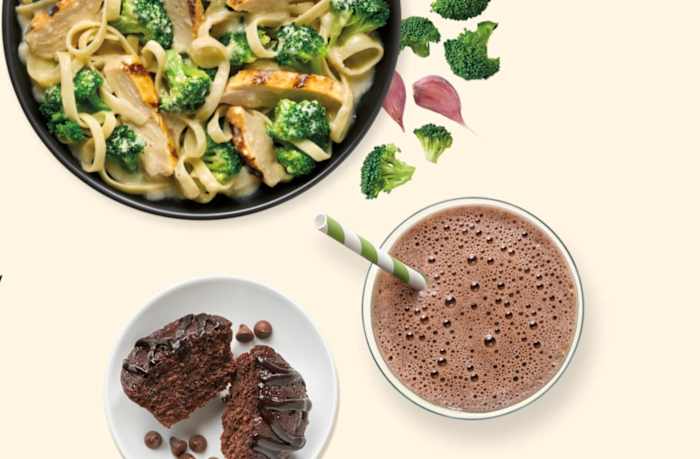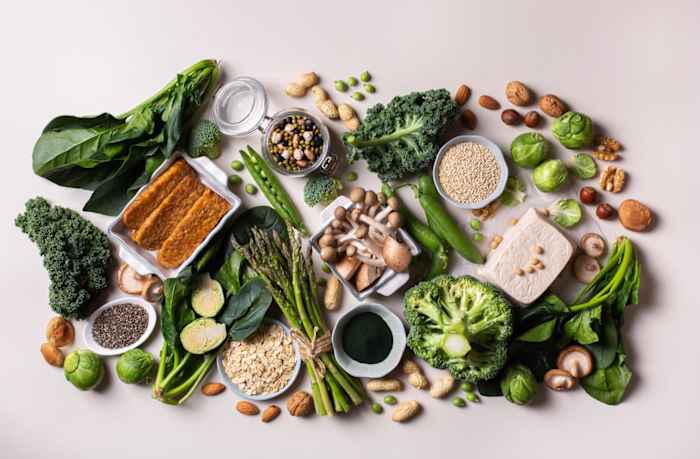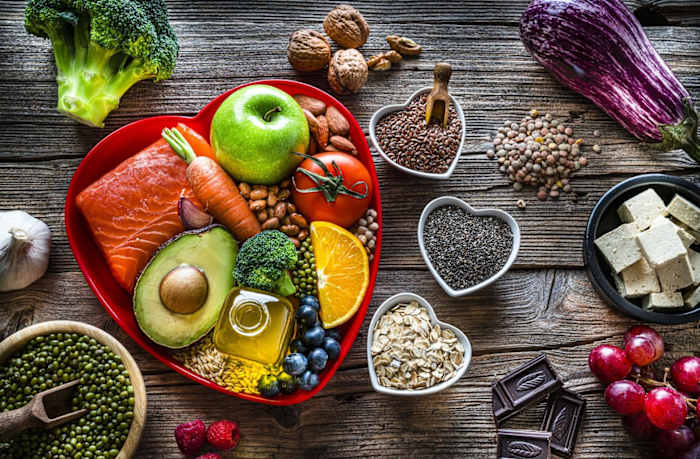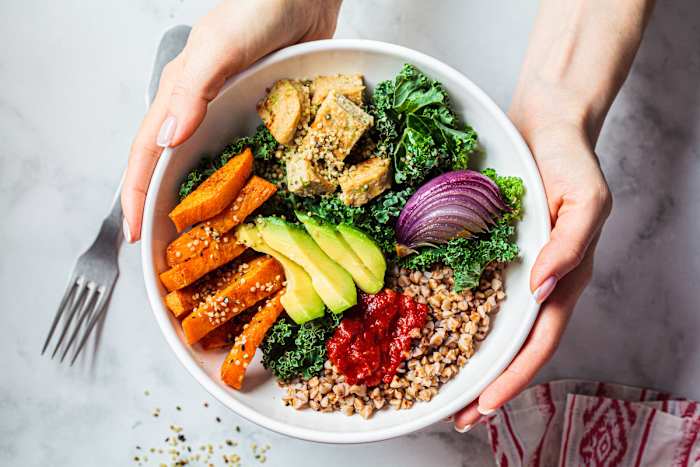The products featured in this article have been independently reviewed. When you buy something through the retail links on this page, we may earn commission at no cost to you, the reader. Sports Illustrated editorial staff are not involved in the creation of this content. Learn more here.
Heart disease is the number one killer in the U.S., so it’s no wonder that so many people are looking for ways to reduce their risk. Healthy eating plays a bigger role in heart health than you might think. The right diet can help lower cholesterol and manage a healthy body weight—two risk factors that contribute to heart health.
In a diseased heart, the arteries get clogged. This happens when plaque (from cholesterol) sticks to the lining of blood vessels. As passages grow more narrow, it’s harder for blood flow to get to the heart, and your heart has to pump harder to move the blood. When blood flow is blocked, that’s when the heart muscle is damaged.
In this guide, we give an overview of the best diets for heart health, including the pros and cons of each eating plan. We’ll also explain how to protect your heart with diet and how to find the best diet for you. Keep reading if you’re ready to start eating heart-smart.
This content is meant to be informative, but should not be taken as medical advice. It is not intended for use as diagnosis, prevention or treatment of health problems. Always speak with your doctor before starting any new supplement or exercise regimen.
Our Picks for the Best Diets for Heart Health:
Interested in managing your diet with an app? We recommend you check out Noom.
Nutrisystem
Nutrisystem is a meal delivery service focused on weight loss, by providing pre-portioned, ready to heat-and-eat meals. With this program, you’ll eat six meals and snacks per day, with the option to incorporate meal replacement shakes. Additionally, the Nutrisystem app, NuMi, provides you with healthy recipes and helps tailor your diet to your specific needs, plus gives hydration and exercise reminders. Weight loss and exercise can help boost heart health. What really sets this program apart from dieting on your own is access to nutrition professionals that are available to help answer any questions you may have.
Pros:
- Pre-portioned, ready-to-eat meals
- Low-carb and low-fat options
- Access to nutritionists and registered dietitians
Cons:
- Expensive
- Not compatible with a vegan lifestyle
Mediterranean Diet
The Mediterranean Diet is based on the traditional eating habits of Romans and Greeks living around the Mediterranean Sea. It’s a healthy, balanced way of eating based on foods like seafood, olive oil, cheeses, vegetables, bread and wine. Yes, wine in moderation is part of this diet! Several studies have shown that moderate red wine consumption protects the heart and may prevent heart disease.
Mediterranean dishes are rich in aromas, colors and healthy monounsaturated and polyunsaturated fats. Eating the “Medi way” means enjoying flavorful foods seasoned with herbs and spices. Spices like turmeric and curcumin may protect the heart from disease.
The Mediterranean diet is more than a formal diet with a set meal plan—it’s a healthy lifestyle that invites you to slow down and enjoy meals with family and friends. This diet also encourages an active lifestyle, socialization and a slower, lower stress lifestyle, all of which are good for the heart.
The Mediterranean diet has reduced the risk and complications of heart disease in many clinical trials. It’s generally safe for all ages, and recipes are easily modified for different tastes.
Pros:
- Safe for all ages
- Flavorful foods higher in fats
- May lower stress
Cons:
- Could cause weight gain if foods aren’t eaten in moderation
- Needs to be modified for those with seafood allergies
Vegan Diet
A vegan diet is one of the best diets for heart health. In fact, following a vegan diet could lower your risk of ischemic heart disease by up to 25 percent. Vegans do not eat meat, poultry, seafood or eggs. They also avoid animal products such as cheese, milk, gelatin and bee pollen. Instead, they eat fresh fruits, vegetables, white or brown rice, grains (including cereals) and soybean-based products. As a result, vegan diets are typically low in saturated fat and cholesterol. They’re also high in fiber, magnesium and potassium, thanks to their emphasis on fruits and vegetables.
Studies show that vegans have lower blood pressure and cholesterol than non-vegans do. Vegan and vegetarian diets may also lower the risk of diabetes by 53 percent. The nutrient-dense foods that vegans eat—especially fruits and vegetables—are full of antioxidants that protect against heart disease by preventing damage from free radicals (unstable molecules). Plus, compounds called sterols from plant-based foods are known to reduce low-density lipoprotein (LDL) or “bad” cholesterol levels.
Balanced vegan and vegetarian diets are safe for most people. However, some experts warn that vegan diets increase the risk for certain nutrient deficiencies, like Vitamin B-12, calcium, zinc and selenium. It’s wise to check with your doctor or dietitian before starting any diet to find out how it could affect you.
Pros:
- Cuts risk of diabetes in half
- Lowers “bad” cholesterol levels
- High fiber diet is good for gut health
Cons:
- Could increase the risk of certain nutrient deficiencies
- More restrictive
The DASH Diet
The heart-healthy DASH Diet was developed over 20 years ago by the National Heart, Blood, and Lung Institute (part of the National Institutes of Health or NIH) based on the Dietary Approaches to Stop Hypertension (DASH) study. Research has shown that the DASH plan helps lower blood sugar levels, cholesterol and insulin resistance, and it’s now recommended by cardiologists as one of the best diets for heart health.
The DASH diet limits added sugars and red meat and instructs you to lower your sodium (salt) intake to less than 2,300 milligrams daily. The diet also requires you to get daily servings from each food group:
- Fruits (four servings)
- Vegetables (three to four servings)
- Whole grains (six to eight servings)
- Low-fat dairy (two to three servings)
- Lean meats (three to six servings)
- Nuts, seeds, legumes (three to five servings)
- Fats and oils (two to three servings)
U.S. national guidelines now advise anyone with high blood pressure (120/80 mmHg or higher) to start the DASH diet to manage their blood pressure, and the American Heart Association also recommends DASH for heart health.
Pros:
- Family-friendly, safe for all ages
- Scientifically researched
- Improves blood sugar and cholesterol levels
- Does not eliminate any food group
Cons:
- Requires tracking, weighing and measuring food servings and calories
- It may take time to adjust to the taste of foods with low sodium
The Flexitarian Diet
The Flexitarian diet, also known as the “semi-vegetarian diet,” is a flexible way to enjoy food and improve heart health. It’s essentially a vegetarian diet, but with the freedom to occasionally enjoy lean meats. Flexitarians limit meat to nine to 28 ounces once or twice a week and focus on whole foods (think unprocessed dairy products) over processed ones. They also limit sugar consumption (even natural sugars like honey).
Studies show that the Flexitarian Diet improves blood pressure and lowers inflammatory markers that increase your risk for heart disease. It also helps lower risk for type 2 diabetes and cancer. The Flexitarian diet is safe and relatively easy for anyone to follow, and is best for those who want to cut down on their meat and dairy intake without fully committing to being vegetarian or vegan.
Pros:
- Easy for most people to follow
- Lowers risk for certain diseases
- Safe for anyone to try
Cons:
- Takes adjustment for those used to eating meat and dairy with every meal
The Ornish Diet
The Ornish Diet is a vegetarian diet that improves heart health by reducing saturated fatty acids (SFAs) and cholesterol. It limits fat to only 10 percent of your daily calorie needs, while carbohydrates make up 45 percent, and protein takes up 35 percent. U.S. News & World Report ranked it number one in best heart-healthy diets. (The DASH Diet took second place.)
This diet is based on the work of Dr. Dean Ornish. He showed that a low-fat, plant-based diet could help reverse heart disease. Like the Mediterranean diet, the Ornish diet allows you to drink alcohol and is more of a lifestyle than a diet. It includes better nutrition (ex: low fat, whole foods), regular exercise, stress management and social support.
The diet prohibits poultry, meat and fish, but allows dairy and eggs. Instead, on this plan, you’ll fill up on foods rich in vitamins, including:
- Fruits and veggies
- Whole wheat pasta and bread
- Legumes (like lentils, chickpeas and black beans)
- Non-fat dairy products
- Yogurt made from soy milk
- Dark leafy greens
- Nuts
The Ornish diet is safe for people of all ages and backgrounds; however, people with kidney disease or on blood thinners should check with their doctor before starting, since this diet may be high in potassium and Vitamin K.
Pros:
- No calorie counting
- Lowers the risk of heart disease and decreases inflammation
- Often leads to weight loss
Cons:
- Eliminates meat, which will be difficult for some
- Very low in fat, which may be a big adjustment for some
The TLC (Therapeutic Lifestyle Changes) Diet
The Therapeutic Lifestyle Changes (TLC) Diet was created by the NIH as part of the National Cholesterol Education Program (NCEP). It’s a three-part program that uses diet, exercise and healthy weight to lower cholesterol and triglycerides. It may also have the added health benefit of weight loss, which is good for your heart health.
The diet recommends that fat make up 25 to 35 percent of your daily intake. Higher fat allowance means you’ll still enjoy healthy fats—like avocados—on this plan. TLC emphasizes whole foods low in SFAs and cholesterol, and it encourages eating plenty of fruits, veggies and whole grains like quinoa, oats and rice. In contrast, it limits meat consumption to five ounces per day of lower-cholesterol meats like poultry and fish.
The TLC Diet also includes 30 minutes of moderate-intensity exercise most days of the week. It limits total caloric intake to 1,000 to 1,200 calories per day for women and 1,200–1,600 calories per day for men. Check with your doctor before starting this diet to make sure you are safely restricting your calorie intake.
Pros:
- Family-friendly for children, teens and adults
- Works for vegetarians and omnivores
- Often leads to weight loss
Cons:
- Many dos and don’t to remember and follow
- Very low-calorie diet, so it’s difficult to eat out on this plan
How to Choose the Best Heart-Healthy Diet For You
To choose the best heart-healthy diet for you, consider what program will best fit your lifestyle, health goals and personal preferences. For instance, someone who makes dinner for their family every night may find it harder to stick to more restrictive plans that their children may not like. (No one wants to make two different meals each evening!)
If you frequently eat with others, you’ll also want a flexible diet that won’t disrupt your normal routine. Low-sodium diets (like DASH) make finding healthy foods at restaurants more difficult, so if your life or job requires you to dine out often, try a diet that focuses on lowering fat or increasing plant-based foods.
How Diet Impacts Your Heart
Heart disease is the leading cause of death in the U.S. Genetics and environment help determine your risk, but lifestyle habits like diet and exercise play a bigger role in your risk. The foods you eat can improve your heart health or increase your chance of ending up with chronic diseases.
A 2021 study in the journal Science found that eating foods high in SFAs and choline (a nutrient found in red meat, eggs and dairy products) contributes to plaque buildup in the arteries. In contrast, eating a plant-based diet high in sterols can protect the heart.
Which Foods to Avoid for Heart Health
As a general rule, here are the foods to avoid for heart health:
- Saturated fats: The types of fat found in meat, butter and other animal products are saturated. They’re known to contribute to inflammation and increase your risk of heart disease. Avoiding saturated fats can help lower cholesterol levels and your risk for heart disease.
- Trans fats: Also called hydrogenated or partially hydrogenated vegetable oils, trans fats increase LDL cholesterol when consumed regularly, according to the Mayo Clinic. They’re often found added to processed foods for texture in the form of canola oil. Instead, opt for foods without hydrogenated oils, and look for healthy polyunsaturated and monounsaturated fats.
- Ultra-processed foods: Anything processed will have additives or preservatives that may lead to weight gain and pre-diabetes. Avoid processed foods as much as possible.
Heart Healthy Diets FAQs
What foods cause plaque in arteries?
Arteries can become clogged with plaque, which leads to cardiovascular disease. Several factors cause atherosclerosis (plaque buildup) in arteries, including a sedentary lifestyle, smoking, stress, anxiety, genetics, obesity, high cholesterol, high blood pressure and diets high in saturated fats.
How can I rebuild my heart health?
It’s tough to say for certain if you actually can rebuild your heart health because cardiac tissue (heart muscle) can not regrow or regenerate after a heart attack. However, many heart doctors and dieticians believe that heart disease is reversible and that you can strengthen your heart with diet and exercise.
Can you reverse clogged arteries?
According to doctors at Harvard Medical School, it may be possible to remove plaque from arteries with extreme diet and lifestyle changes. Medications like statins may also reduce plaque in clogged arteries. Surgery is a last resort to remove plaque from clogged vessels and prevent heart damage.
How can you detoxify your heart?
Studies show that food-based nutrients can help detoxify the body, including the heart. If you’re looking for a diet to detox the heart, choose the following: cruciferous vegetables (specifically watercress, garden cress and broccoli), berries, grapefruit, fish oil and omega-3 fatty acids, garlic and spices like turmeric.
Final Thoughts
There are many heart-healthy foods and diet plans out there. With a little planning and some trial and error, you can find a diet that suits your tastes and lifestyle. It isn’t always easy to make the right choices when it comes to a heart-healthy diet, but the more you know, the better your chances are of achieving your health goals.
Prices are accurate and items in stock as of publish time.
















